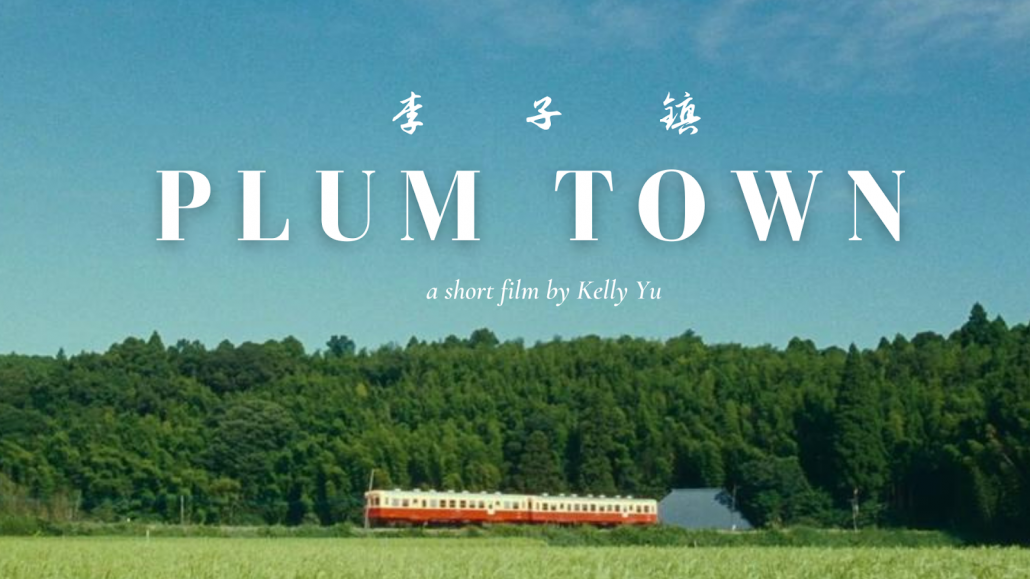‘Plum Town’ is an ode to Chinese family history

After a trip to China last year, Kelly Yu, a filmmaker and sophomore majoring in cinematic arts, film and television production, was inspired to write “a love letter to family, heritage, and identity.” Yu has since started the production of her new short film “Plum Town,” which follows the story of a young man who returns to China to convince his father to sell his family’s plum orchard.
The film follows Xiao Li, a young land developer, who returns to the countryside outside of Shanghai for the first time in decades. His father, Old Li, is still holding onto tradition in the form of their family’s plum orchard that Xiao Li wants him to sell.
“I grew up with just such a melting pot of cultures,” Yu said. “My parents raised me to speak fluent Chinese because they were very passionate about that. And so I grew up kind of tiptoeing between the lines of China and America. I think that it raises a lot of questions about, not only new versus old, but also tradition versus change, and it also made me think about the disconnect I’ve had with my heritage and my culture.”
The film is based on her own story; for generations, her family farmed corn in the Chinese countryside. When Yu visited last summer, she discovered the farmland that had previously surrounded them had been replaced by a factory.
“There are people like my grandpa, who, you know, it symbolizes our history or family’s history, and part of that is being erased,” Yu said.
Yu said that one of the main reasons why she’s creating this short film is to bring awareness to how many local farming communities are being affected by large-scale developments like factories. Though the story explores the contrasting ideas of new and old, it also serves as a reminder of the traditions that are being stripped away.
The original idea for the story began with a single logline — “Game of Thrones” but with Chinese farmers. Yu’s first screenplay came from this logline: a story about three feuding farming dynasties warring over land. But when it came to fruition, she said the story didn’t feel personal enough.
“I couldn’t just continue and this idea just kept like knocking on the door, and kept coming back. And so I was like OK, I’m just going to do it, I’m just going to see where this takes me. And it eventually evolved into a 110-page script,” Yu said.
After workshopping the script with her mentor, Yu submitted her work to The Black List, a filmmaker’s organization that allows writers to upload their unproduced screenplays and be critiqued by professionals in the industry. According to Yu, it’s known for its “really brutal scores.” Despite its usual harshness, Yu managed to score an outstanding nine out of 10, gaining a fair amount of traction for the work.
But even with successes like these, there are always challenges. The team mentioned the difficulty of planning during the coronavirus pandemic, especially when trying to pass off Southern California for rural China because of travel restrictions. Yu also talked about the difficulty of being a writer and having the weight of comparison by people you look up to because of the competitive nature of the film world.
“Even when you get notes back, like the most wonderful people that I send my work to give me feedback, that I agree with, that I respect,” Yu said. “But it’s still that feeling you get when they point out that something is not good.”
Yu also said that, while the film gained a lot of attention after The Black List’s score, there were still times when self-doubt was the biggest challenge.
“I got an opportunity to have a really respected lit manager read my script. And I was so excited, and I was like ‘oh my gosh like this is it.’ And he replied and said it wasn’t for him, and for the longest time, that made me doubt everything.” Yu said, “But it’s also very collaborative. I mean, like, the best thing about being at SCA is my amazing classmates who have always read my stuff and have taken the time to read draft after draft. And you like can’t find that anywhere else.”
Despite the challenges filmmakers often face, whether it be external or internal criticism, she also expresses undeniable enthusiasm for her community and especially for her team.
While Yu originally wrote the story as a feature screenplay, the team is now producing a short film as a proof-of-concept with a number of School of Cinematic Arts collaborators. The team currently consists of three other members: Jean Liu, a graduate student studying producing for film, television and new media, who is acting as her producer, and SCA sophomores Jonathan Chan and Thomas Kim as co-producers.
Liu was formerly an investment analyst in London but chose to move to China to pursue a career in filmmaking; afterward, Liu began working on documentaries before making her way to USC’s Peter Stark Producing Program. Liu said she was originally drawn to Yu’s work because she herself has spent a lot of time in the Chinese countryside.
Liu said “Plum Town” maintains the vibrant culture that’s often overlooked by global politics, and that she recognized the China that she knew in the story. She also said seeing her team members be young and enthusiastic is one of her favorite parts of working on this film; she appreciates their hard work and, as a director, the clear idea Yu has for her film.
Chan, one of the co-producers, is currently interning with 87North Productions and previously worked at Orion Pictures at MGM. Chan said he originally got involved with “Plum Town” after Yu mentioned her writing of the draft during his freshman year. After the project began picking up, Chan continued to help develop the material with Yu, and eventually took on the role of co-producer.
“I feel that when anytime a film can shed a light on something that’s real and connected into a fictional narrative, it just really entices me,” Chan said. “There’s a lot of emotion; the characters go through a really strong arc … There are always conflicts in [family dynamics] because of [the] generational gap. And this film explores that generational gap.”
He said his favorite part so far has been working with Yu on her script, as well as the development of characters. Both Chan and Kim mentioned their enthusiasm for the casting process, especially when considering the father-son dynamic presented throughout the film.
Kim, the third producer of “Plum Town,” became roped in the project after seeing Yu’s feature screenplay and reaching out to her. Kim previously worked on “Si,” a proof-of-concept he’s developing into a feature film. He was one of the first to convince Yu to create the short film as a proof-of-concept to exhibit its feasibility and was largely drawn to the project for a similar reason as Liu; the story considers many serious concepts but is still laced with comedy.
“And that’s what we’re all believing in — rooting for — Kelly and the team … The project is just an extension of the people,” Kim said.
He trusts Yu’s vision; like the rest of the team, the project surrounds Yu’s ideas, but also her enthusiasm and her own motivation.
Together the team is looking to start production this year, though they said much of their planning is currently hypothetical since they still don’t know if they’ll be able to raise a budget.
“Filmmaking is so expensive, and it involves so many people,” Yu said. “And if you think about it, writing is the only thing that is free to a filmmaker and is accessible, and that’s what I love about it.”
To follow the production and progress of the film, check out the “Plum Town” Instagram account and support the project by contributing to their Kickstarter campaign.

